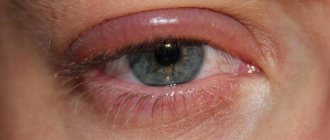Blinking is a natural process of closing and opening the eyelids that serves specific purposes.
In the process of blinking the tear film is restored , and dirt and small foreign particles are removed from the surface of the conjunctiva.
But such a phenomenon can be called normal when it occurs with a certain frequency, but if this process occurs too often or a person blinks one eye, there are certain violations .
What to do if the tic is severe and does not go away?
The choice of treatment method is made only after the cause of the development of this disease has been determined.
For example, if the cause is problems in the family, then the child should attend individual or group sessions with a psychologist. If the tic does not go away, the doctor recommends drug treatment:
- antidepressants;
- nootropics;
- neuroleptics;
- vitamins.
Drug treatment is carried out for 6 months, combining it with massage, taking medicinal baths and visiting the pool. If a child who is not yet 8-9 years old suffers from a nervous tic, then the treatment will be successful, but early tics, in the absence of adequate treatment, can persist until adolescence.
How is massage performed?
To complete it you need:
- Place the child on a chair with a soft back.
- Stand behind the child.
- Use a comb to part the hair on the head.
- After this, you can make massage movements using your index finger.
- Along the parting made, stroke with one finger, and then make light spiral movements.
- Using light pressure, kneading is performed.
- All massage movements alternate with stroking.
- Shock and vibration techniques are not used.
- After completing the cycle, perform the next parting, which is done with a deviation of 2 cm.
- In 1 procedure, you can perform 10-12 partings with a comb.
- After the procedures, the palms are placed in the forehead and back of the head and gentle movements similar to compression are performed (5-7 times).
- When performing a head massage, ointments, creams, and gels are not used.
Causes of frequent blinking
If parents have noticed that their child has begun to blink his eyes frequently and squint, then it is worth thinking about the state of his health. The causes of unconscious, frequent and strong blinking can be not only problems in the functioning of the visual organs, but also dysfunction of the nervous system. The onset can also be an immediate factor, which is not associated with any pathologies
The onset can also be an immediate factor, which is not associated with any pathologies.
Causes of frequent eye blinking in children:
- past viral diseases;
- allergic reactions of the body;
- nervous tic (the eyelid twitches strongly, involuntarily and constantly);
- inflammatory processes in the mucous membranes of the eye;
- loss of vision;
- moral exhaustion, high mental stress;
- overwork;
- a foreign object that has entered the surface of the mucosa.
If an adult cannot independently determine the cause, then it is imperative to visit the attending physician. During the examination, the pediatrician will determine the condition of the eyes and, if necessary, refer you to specialized specialists - an ophthalmologist or neurologist. A disease can be cured only by directly addressing its cause. Relieving symptoms at home is not a good idea in this case.
Eye diseases
Some eye diseases may be the reason why a child blinks his eyes:
- Inflammation of the mucous membrane - conjunctivitis. The disease is accompanied by slight swelling. This swelling causes discomfort, and the child tries to get rid of the discomfort by blinking frequently.
- Mechanical damage. During noisy games, minor damage may not be noticed. The problem can worsen when the baby rubs the injured eye with dirty hands - this contributes to the development of infectious pathologies.
- Deterioration of vision. Children from an early age begin to damage their eyes with gadgets, so 100% vision is a rarity these days. The initial stage of vision deterioration is accompanied by unconscious squinting of the eyes; the child may tirelessly flap his eyelids and squint, trying to improve the visible image.
- Dry surface of the mucous membranes is a fairly common disease in children. The patient usually complains of discomfort and itching in the eyes. The reasons may lie in an unhealthy lifestyle. The baby overloads his visual organs as a result of prolonged contact with the monitor. Excessive dryness of indoor air can have a similar negative impact - in this case, it is recommended to purchase an air humidifier.
The reasons may be completely different physiological processes. Often, movements of the eye muscles can be triggered by traumatic brain injuries or side effects of medications.
It is also worth taking into account the hereditary factor. Be that as it may, you should consult a specialist
Psychological problems
Psychosomatics is perhaps the most common cause of the development of many diseases. Quite often, blinking is caused by emotional imbalance, for example:
- Difficult situation in the family. Home should be a place of rest for everyone. When a child experiences a lot of negativity, this can also cause a long-term nervous tic. In this case, parents should talk to their child and clarify the situation.
- Low self-esteem. In 90% of cases, this phenomenon is the fault of the parents. The baby needs to be praised more often and made to understand how important and successful he is.
- Low level of social adaptation. The lack of social contacts, which are accompanied by positive emotions, negatively affects the mental health of the child.
- Emotional stress that is chronic. As a rule, this factor is associated with school. A hectic school life, exams and tests can lead to similar manifestations of neurosis.
Tics in children associated with a psychological factor are a temporary phenomenon. Statistics show that children up to adolescence are susceptible to this phenomenon. Parents should take a closer look at their children: if they not only squint their eyes, but also withdraw into themselves and show signs of depression, they should immediately be taken to neurology and shown to specialists. If a child is not impressionable, then support and love will help him get rid of nervous tics. You can get rid of the pathology within 3-4 weeks.
Preventive measures
Preventive actions:
- regularly visit an ophthalmologist to monitor the condition of the visual organs;
- provide conditions for reading or writing (lighting, comfortable table and chair);
- limit time spent watching TV, working with the computer and playing with gadgets;
- create a safe and calm environment at home (no quarrels or shouting);
- avoid stressful situations if possible;
- support the baby, give him enough attention;
- ensure proper rest;
- make sure he doesn't get overtired.
Pediatrician, allergist-immunologist, graduated from Samara State Medical University with a degree in Pediatrics. Read more »
Causes of frequent blinking
All causes of frequent blinking in children can be divided into two broad groups:
- Ophthalmological;
- Neurological.
You must figure out why your child developed such a pathology and what led to it. Having identified the root cause of such a deviation, it will be much easier to get rid of it.
Ophthalmological causes of frequent blinking
There are several ophthalmological reasons for this phenomenon:
- The presence of a foreign body in the eye;
- Dry mucous membranes;
- Decreased normal visual acuity.
How to remove a speck from an eye is described above. It is necessary to act completely differently if a large foreign body gets into the eye. This could be a wood chip, a pebble, or any other object. If it sits tightly in the eye, removing it yourself with your hands or tweezers is strictly prohibited. In this way, you can cause even greater injury to the child.
Hurry to see a pediatric ophthalmologist at the clinic or the appropriate inpatient department. There, the foreign body will be removed with minimal negative consequences for the child and restorative treatment will be prescribed. If you seek qualified medical help in a timely manner, there will be no complications.
When attempting to independently remove a foreign body and self-medicate, the child’s vision may significantly decrease.
Another common cause of frequent blinking in childhood is dryness of the cornea. This symptom manifests itself with the active use of modern gadgets, long reading in poor lighting, when the child needs to constantly concentrate his gaze. Modern pediatric ophthalmologists insist on significantly limiting the time children spend with computers, tablets, and smartphones.
The reality is that even one-year-old children actively watch cartoons, and two-year-olds are already playing computer games. It is easier for parents to hand a tablet to their child than to deal with its development themselves. Adults have more free time, but this has an extremely negative impact on the health of the younger generation.
Decreased visual acuity can also cause frequent blinking. The child needs to constantly strain his eyes to see anything. When your baby blinks, the eye muscles automatically relax. That is, this is a way of “resting” for the eyes. Only a doctor can determine why a child’s vision is falling, stop this process and restore the functioning of the sense organ. To do this, you need to contact a specialist in a timely manner. Frequent blinking is a reason to visit an ophthalmologist.
Neurological causes of frequent blinking
If a baby blinks frequently, this does not mean that he has poor eyesight. Often this symptom is associated with neurological problems. Parents must keep their finger on the pulse and control all the child’s reflexes. Even without first contacting a doctor, you can understand the nature of the problem in a young patient. If, when blinking, he only closes his eyelids without other accompanying involuntary movements, there is a high probability that the cause of this phenomenon is ophthalmological.
If blinking is accompanied by strong repeated squinting, as well as twitching of the face and pursing of the lips, then the reason is a disturbance in the functioning of the central and peripheral nervous system. Such deviations can be caused by taking certain medications, head injuries, overwork, stress, and disorders of brain activity. A visit to a pediatric neurologist is mandatory, who will conduct a series of diagnostic tests to identify the root cause of the problem and give recommendations on how to eliminate it.
It is strictly prohibited to ignore any neurological manifestations in the younger generation. You should not expect that the child will “outgrow” it; this phenomenon will go away on its own. The child's body gives an alarm signal. Parents are obliged to respond to it. Sometimes innocent manifestations hide serious health problems. The sooner they are identified, the easier it is to correct and eliminate them.
The children's nervous system is flexible and pliable. Some pathological conditions and syndromes are corrected only up to a certain age. It is in the parents' interests to identify them as early as possible. If your child begins to blink too often, and the attending physician suggests visiting a neurologist about this problem, do not dismiss such advice.
Treatment options
Keep in mind! Blinking in the event of a small foreign body (motes and dust particles) getting into the eye, which caused the child to blink several times, does not require treatment.
In cases where this object is large enough and the organs of vision are not able to wash it with tear fluid, it is possible to consult a doctor .
In order to soothe the irritated surface of the eye in such cases, you can use one-time lotions based on chamomile or calendula .
In other cases, treatment depends on the cause of frequent eyelid closure.
If the cornea becomes dry, to use moisturizing for a certain time , but in this case it is not symptomatic treatment that is important, but rather the elimination of the cause.
Therefore, children should watch TV or be in front of the computer for a limited time.
If such a disorder has a neurological origin, it is first necessary to provide the child with a calm and friendly atmosphere at home .
And to do this, it is necessary to exclude any quarrels and discussions of serious problems in the family circle and, in general, to avoid situations that seem quite natural to adults, but may be stressful for a child.
Remember! Physiotherapy procedures, gymnastics, massage, as well as soothing baths with medicinal herbs and reflexology may be prescribed in such situations as prescribed by a doctor.
Why is this happening?
Blinking your eyes can increase your concentration on surrounding objects. Allows a person to concentrate thoughts to carry out any actions. During periodic closing of the eyelids, relaxation of the nerve cells of the brain occurs (within a fraction of seconds), which allows the gaze to be better focused.
If the process of rapid blinking in a child is caused by natural stimuli:
- ingress of dust and dirt particles;
- foreign object;
- as a result of strong wind;
- when reading and watching TV for a long time.
Causes of eye blinking in a child
The appearance of this symptom may occur due to ophthalmological or neurological reasons. In the first case, you need to contact an ophthalmologist.
Using visual and hardware examination, the doctor will determine the condition of the cornea of the eye, whether it is overdried.
If this is the reason behind this pathological process, the doctor will prescribe eye drops to moisturize the cornea.
Eye blinking can also occur:
- as a consequence of microtraumas;
- after penetration of a foreign body.
Sometimes frequent blinking may have a neurological etiology. This is due to the child’s psycho-emotional state, which may be disrupted due to changes in life circumstances (first trip to kindergarten, school).
Based on the above reasons, it is possible to identify the main negative factors that provoke frequent eyelid closure:
Deterioration of visual perception
If frequent blinking is accompanied by a deterioration in visual acuity, a symptom of squinting appears, in which the child tries to focus and concentrate on a specific object. In this case, the blinking symptom may resemble convulsive squinting of the eyes
It is unacceptable to treat such a condition on your own; it is best to consult an ophthalmologist to establish visual acuity and, if necessary, choose glasses;
Dryness of the eyeball. A dry cornea is the cause of the development of this unpleasant symptom. After prescribing eye drops that moisturize the cornea (Visine), it is necessary to review the child’s daily routine. At the same time, be sure to limit: watching television programs; spending time in front of a computer monitor; reading fiction and educational literature.
Excessive eye strain. This occurs due to the fact that the visual organs are given little time to recover. Daytime and nighttime sleep standards are not observed. Increased school workload in the classroom leads to chronic fatigue and overwork of the visual system, headaches occur, which leads to frequent blinking;
Corneal injury. Sometimes a foreign body can penetrate the eyeball; these can be dust particles, fibers of fabric, or hair. Even after their removal, the symptom of frequent eyelid closure remains. This may be explained by the fact that a foreign body has damaged the mucous membrane of the eye (a small cut or microcrack has appeared);
Blepharitis. This disease has the peculiarity of developing with the appearance of a symptom resembling sand in the eyes. Therefore, the child tries to get rid of this sensation by blinking frequently. With this disease, this symptom is observed for a long time. It goes away within a few days after blepharitis is cured;
Development of allergies. Growing homemade indoor flowers is not always a harmless activity. When flowering, pollen can fall on the mucous membrane of the eye, causing a burning sensation of unbearable itching. The eye tries to eliminate external irritants from its mucous membrane, this leads to rapid blinking of the eyelids;
Blepharospasm. This is an involuntary contraction of the facial muscles that are located around the eye. This symptom resembles blinking, but occurs in a more pronounced form, and often looks like prolonged squinting. Such a manifestation of a clinical sign may indicate the presence of:
- tuberculous-allergic conjunctivitis;
keratoconjunctivitis (dry form); trichiasis.
Tiki. To establish the cause of the nervous spasm of the facial muscles (tic), you need to contact a neurologist. Only he can prescribe the correct treatment that will cope with this disease.
What to do and how to treat it?
If you find even one or two warning signs in yourself, there is no need to make a diagnosis yourself, much less self-medicate. Go to the ophthalmologist's office. To diagnose the disease, the doctor must assess the clinical symptoms, their severity, collect anamnesis, and conduct a series of studies.
As part of complex treatment, “artificial tears” preparations are usually prescribed - tear substitutes intended to wet the ocular surface or stabilize the joint. Among those registered in Russia, Oksial, Oftolik, Lacrisify, Defislez, Lakrisin, Oftagel and others are widely used. There is a wide choice, they are sold without a prescription, but you need to use those recommended by a specialist. Preference is given to medications that do not contain preservatives.
Drops, gels and ointments really alleviate the patient's suffering. But it is not always convenient to bury them or place them under the eyelids, sometimes several times a day. The innovative product Delfanto® in capsules does not have this drawback - an alternative method for eliminating the symptoms of dry eyes.
There is no need to drip or otherwise apply anything to the irritated mucous membrane; just take one capsule a day in the morning. Easy, painless and hygienic. But the most important advantage is not in the form, but in the content. Delfanto® does not simply replace tear fluid, moisturizing the cornea. This effective and safe solution to the problem, which specifically targets the lacrimal glands, stimulates the production of your own tears - a unique natural complex that no substitutes can compare with.
The active component of Delfanto® - extract of the fruits of Aristothelia chilean - MaquiBright® is produced in Germany and meets GMP quality standards.
Why do we blink?
Spontaneous blinking is different from reflexive blinking, which serves to protect the eyes from an external object and from voluntary blinking, which we do on purpose.
Even in adults, the main purpose of spontaneous blinking is something mysterious. It is generally believed that tears are spread on the surface of the eye to lubricate it while removing dust and other irritants.
Researchers say this is only one part of the story. We blink more often than necessary to keep our eyes wet, so blinking must have other functions.
The investigation into the nature of spontaneous blinking goes back a long way. In 1928, two scientists from Scotland, Eric Ponder and RP Kennedy, conducted a comprehensive study of the factors influencing spontaneous blink rate in adults. In the absence of a video camera to reliably record eye reflexes, the scientists built a small device from silk thread, wood and a spring connected to an electrical circuit. They attached the device to the participants' eyelids. Whenever the participants blinked, their closing eyelids pulled a spring and caused a break in the circuit, registering a signal.
The researchers found that as long as the conditions were the same, each person's flashing indicator was similar to a clock. The blink rate was the same in dark and well-lit rooms. Blind people blinked just as often as sighted people.
The speed was also independent of eye moisture and dryness. When the researchers took their subjects into the damp buildings of their university's botanical department, they found that the blinking behavior was no different from what the scientists had observed in the dry rooms of various Turkish baths.
But blinking always increased in tandem with the "mental stress" of study participants, Power and Kennedy. For example, study participants blinked more when they were excited or angry, and witnesses in legal trials blinked faster when questioned by the opposing party, the researchers found.
All this led Ponder and Kennedy to propose that spontaneous blinking is not regulated primarily by the condition of the eyes, but instead by a "blinking center" in the brain. Researchers have suggested that one of the functions of blinking is to relieve tension, similar to flirting and nervous finger movements.
Modern research has provided more ideas about why we blink. One hypothesis is that the brain takes a moment of rest when we blink. In a 2012 study published in the journal Proceedings of the National Academy of Sciences, researchers observed the brain activity of a group of people watching the television show "Mr. Bean." Brain scans have shown that when people blink, brain activity spikes in the “default network,” which is the group of areas of the brain that are most active when we are awake but resting and the mind is cleared from the outside world.
Another study, published last year in the journal Current Biology, found that blinking focuses our gaze. "Our eye muscles are quite sluggish and imprecise... our results suggest that the brain measures the difference in what we see before and after blinking and tells the eye muscles to make the necessary corrections," says researcher Gerrit Maus, associate professor of psychology at Nanyang Technological University in Singapore.
Severe eye disease and blinking
Sometimes eye blinking can indicate serious illnesses: Nervous system disorders, in particular blepharospasm - a condition characterized by rapid, uncontrolled blinking. These spasms may also be accompanied by other facial changes (uncontrolled movements of the eyes and face, grimaces). Brain damage such as stroke, tardive dyskinesia, etc.
Serious symptoms:
- blurred vision or double vision;
- increased sensitivity to light;
- discharge from the eyes;
- paralysis of the eye muscle (strabismus);
- facial paralysis;
If any of these symptoms occur, you should consult a doctor immediately.
Why does this happen?
Why does a child blink his eyes often?
There are many reasons for this condition in a child.
You need to pay attention to a combination of factors. Maybe the baby is just tired and wants to sleep, maybe something got into his eye
First of all, you need to listen to the child.
Older children can express their discomfort in words and explain what exactly is bothering them, that their eye hurts or there is a feeling of a foreign body. With small children the situation is more complicated; the baby won’t tell you what’s wrong with him, you’ll have to figure it out on your own.
Difficulties with the organ of vision
If there are no apparent reasons for frequent blinking, but the child still begins to blink his eyes frequently, it is worth visiting an ophthalmologist. Today, children can constantly spend time in front of the TV, computer or with a phone in their hands. For fragile children's eyes, this can be very stressful.
The TV screen can cause the cornea to dry out. This happens because when we look at something closely (a cartoon, a book, or a game on the phone), the blink rate noticeably decreases. Which leads to increased evaporation of moisture from the surface of the eye. The body tries to compensate for this by blinking heavily.
At your doctor's appointment, you can find out whether the surface of your child's eye is sufficiently moisturized. By the way, “dry eye syndrome” is a condition of dryness of the cornea; in addition to frequent blinking, you may notice redness in the child’s eyes, that he rubs his eyes and begins to squint frequently.
Another option is decreased vision. When the eye loses the ability to examine an object, it will reflexively begin to blink frequently. You may suspect a decrease in visual acuity if the baby begins to squint his eyes, trying to see something in the distance. A visit to the ophthalmologist is necessary to find out the nature of this phenomenon and correct it (eliminate dryness or correct vision).
Psychological reasons
Frequent eye blinking in children can be caused by psychological problems. The cause of frequent blinking can be uncontrolled contraction of the facial muscles. In this case, there is a nervous tic, twitching of the mouth and cheeks and other signs. This is often accompanied by headaches. In this case, a visit to a neurologist is necessary.
Such changes may be a consequence of impaired neuromuscular transmission. Involuntary contractions occur due to a decrease in the amount of inhibitory mediator (gamma-aminobutyric acid) synthesized in the nervous tissue. Why this happens is not always clear. This may be a genetic defect or a consequence of an “overload” of the child’s nervous system. Children most often suffer from nervous tics at the age of 6-7 years, during the period of adaptation to school life.
If you see that his blinking is similar to a wink, this is most likely a nervous tic.
What is a nervous tic
Why does a child blink his eyes often?
A nervous tic is an involuntary contraction of the muscles of the eyelids, more often than one. They are paroxysmal in nature and appear in moments of nervous tension. Factors that increase the chance of developing a tic:
- genetic predisposition (if one of the parents had such a problem, then there is a high probability that the child will have it too);
- decreased immunity;
- some medications (this is written in the instructions for the medications as a side effect);
- hypovitaminosis B6, decreased potassium, calcium, magnesium in the blood.
Stress can be a trigger for a nervous tic. The possibility of traumatic brain injury cannot be ruled out. When hitting the head, neurological pathologies are not at all uncommon.
Such tics cannot be ignored. Otherwise, the process may become more pronounced and noticeable (hand tremors and involuntary contractions of the muscles of the body and limbs will begin).
What causes a nervous tic?
The above reasons for frequent blinking are the most common. However, the cause of this child’s condition may be negative emotions that the parents were not even aware of. Tic in a child can be caused by:
- fear of the educator or teacher;
- fear of the dark;
- the quarrel between his parents that he witnessed;
- moving, transferring to another school;
- bullying by peers, etc.
Video “Nervous tics in children”
What is eye blinking?
Physiologically, blinking is caused by three main factors:
- The need to maintain hydration of the eyeball. The mucous environment of the organs of vision contributes to the natural cleansing of the eye.
- Tired eyes. This is a general irritant condition that includes itching and burning.
- Restoring emotional balance. Sudden, repeated closing of the eyes helps the body take a minimal break and focus on what matters most. This is evidenced by recent research in psychology;











